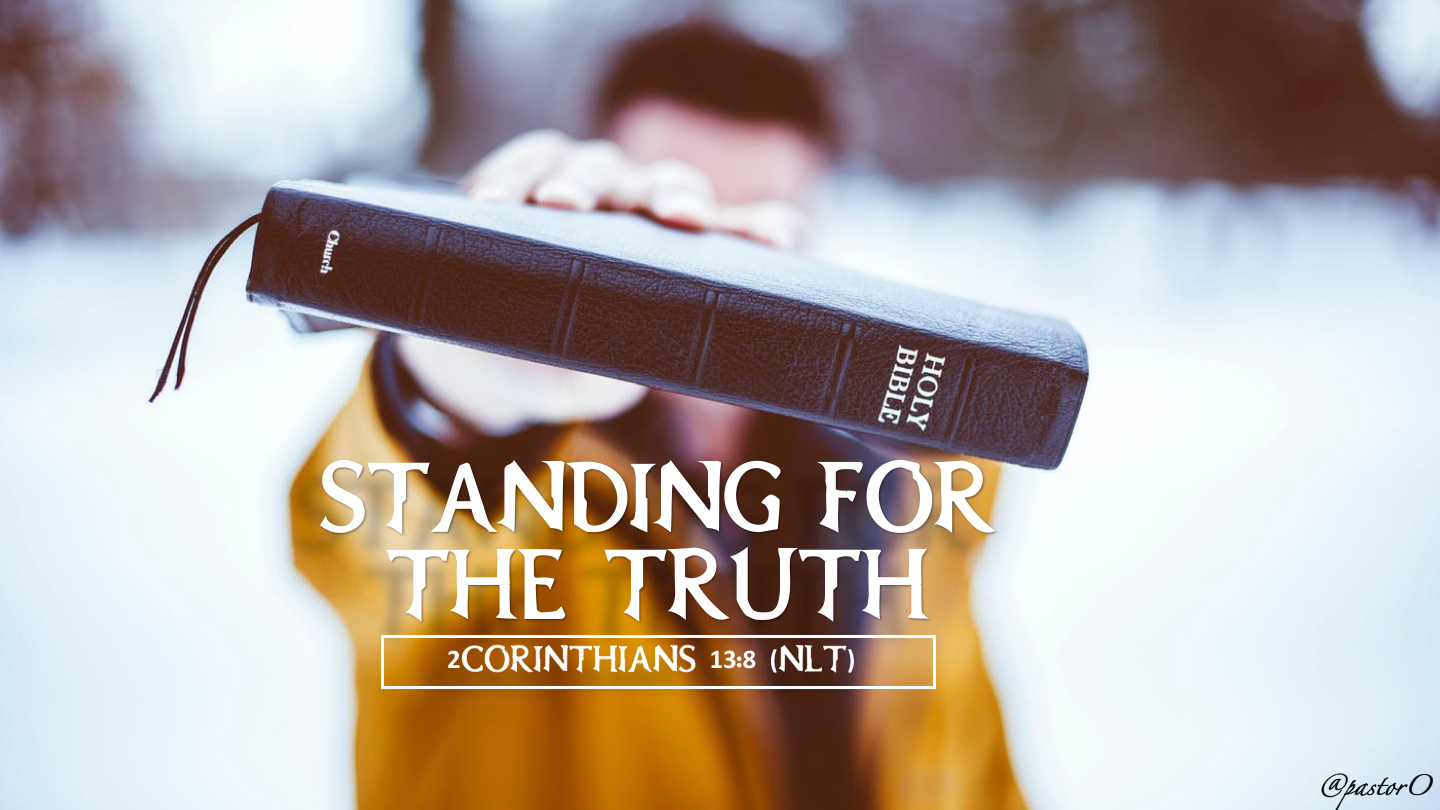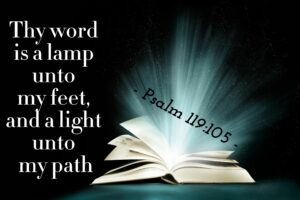
Weekly, we send out to you, our valued readers, articles that inform, stir, and point to Jesus as our only hope. We painstakingly do so because it’s important for Christians to stand on the truth, for the truth. God is the Author of truth and He alone sets the standards. As believers, it’s our duty to discern good from evil, to teach the difference between the holy and profane, and to proclaim truth in a winsome manner. That means doing so with compassion in love. Neither we nor you can afford to remain silent in a time when evil is hardly discerned and confusion abounds; therefore, we must study the Word, be in prayer, and strengthen ourselves through daily devotions. That’s our responsibility; God, in His sovereignty, keeps His word, meets our needs, upholds, strengthens, and sustains us.
What happens when a Christian neglects this sacred and sober duty of standing boldly on truth, diametrically opposing falsehood? The answer is found in Judges 17:11-13; it’s devastating to the believer (v. 11), gives the unbeliever a false sense of authority (v. 12), and gives the unbeliever a false sense of security, misrepresenting God and His Kingdom (v.13).
Each believer has something in common with the Levite priest of Judges 17. According to 1 Peter 1:9 we are also priests, “But ye are a chosen generation, a royal priesthood, an holy nation, a peculiar people; that ye should shew forth the praises of him who hath called you out of darkness into his marvellous light:” It’s my prayer that being part of a royal priesthood is as far as the similarity goes; for as the Family Worship Bible Guide states, “The Levite was a religious mercenary who abandoned the God-given ministry that was his heritage to serve man-made gods for personal gain…He had no convictions or concerns apart from himself…True worship and true Christian service demand loyalty to God and His Word. We must be willing to pay the price of faithful discipleship that we may receive the ‘well done, good and faithful servant’ (Matt. 25:23).”
What does it mean for Christians to belong to a royal priesthood, to be a peculiar people? Priests do not live for themselves; they live for the ones they serve. They were to serve God by representing Him; likewise, as we represent Jesus, His character is to be the defining quality of our lives. As one devotional writer put it, “Jesus is our High Priest. He placed himself between God and us and caused God’s grace to meet our need, and therefore we were redeemed. As Christians we stand between Christ and his Cross on the one hand and the world in its lostness on the other. Our business is to cause that grace of Christ and the need of the world about us to meet. As the Father sent Jesus to us, Jesus sends us to his world and ours.”
Jesus’ life was a seamless whole. Whether he was showing compassion or dealing with sin or rebuking those who belonged to the “church,” His life was one of worship and love for the Father and man. Likewise, worship and holiness, driven by love, must not be relegated to our “spiritual lives” alone. It must seamlessly weave its way through all our pursuits because our redeemed and sanctified life has its source and sustenance in the one, true God who is holy, holy, holy and is love. It’s such seamlessness that causes us to stand boldly and definitively on the truth and for truth, regardless of temporal gain, loss, or persecution.
Now that we have an idea of who we are in Christ, let’s look at Judges 17 to better understand the dangers of not “standing, having done all to stand.”
First, it’s devastating to the believer. Verse 11 teaches us that “the Levite was content to dwell with the man.” It’s a gradual and slippery road that leads to contentment in being unequally yoked. This Levite priest of the true and living God, one who served the Holy One of Israel, was content to turn mercenary, settling for a meager ten shekels and a shirt. His response, when approached by Micah to leave his priestly high calling to participate in idol worship, should not have been contentment; it should have been one of abject horror and righteous indignation.
Don’t be too hasty in casting aspersions upon this fellow without some honest self-examination. How often do we appear content before a watching world and our Savior’s eyes when given the opportunity to stand boldly yet lovingly, responding with silence or a milquetoast word, fearing confrontation or rejection? I fear that our price is often much less than ten shekels and a shirt. For what do we trade our priestly high calling? Acceptance? Friendship? Position? Avoiding persecution? The possibilities are nearly limitless; may God forgive us and help us to do better.
In balancing the two greatest commands upon which hang all the law and the prophets (Matthew 22:37-40), let us take Puritan John Trapp’s words to heart. “Some warmth must be in a reproof but it must not be scalding hot.”
Before moving on to verse 12, I want to remind you of the great necessity in keeping your ministry fervent and alive. Read these dangers with fear and trembling. “Alas, how apt are the best to cool if they are not kept warm by a powerful ministry! We are apt to lose the hatred of sin, the tenderness of conscience, fervency in prayer, and the delights and power of heavenly meditations. How apt is faith to stagger if it is not powerfully undergirded. How hardly will we keep the heat of love, the confidence of hope, the resolution of obedience, without the help of a powerful ministry. Can any that are not blind or proud imagine that they are so holy and good that they are above the necessity of such assistance?” (Richard Baxter) Let us sit under sound, Biblical preaching that clearly applies truth to our lives, exhorting, convicting, and stirring us on to further personal study. Let us similarly minister to others.
Next, verse 12 warns that our contentment with sin and silence in rebuking it gives the unbeliever a false sense of authority; for we read, “And Micah consecrated the Levite.”
Micah’s consecration really meant nothing at all. Why? He had no authority from God to declare a renegade, mercenary Levite as set apart (consecrated) by God to the service of this idolatrous false religion. The Levite, by birth, belonged to God, set apart for His service. Through the Levite’s contented compliance Micah believed that he had the authority to do as he wished.
How often is our silence and lack of “having done all to stand in this evil day” seen as a contented compliance that emboldens the enemies of God, giving them, in their own eyes, authority to continually reject the authority of God, the Word of God, and even the existence of God?
As a fire goes out both light and heat dissipate. Darkness has no power or authority over light and coldness is simply the lack of heat; yet as light and heat withdraw, darkness and cold take over. The same is true spiritually. When the light and warmth of holiness are ablaze within us there is no room for dark and cold. In Matthew chapter five Jesus said that we, as believers, are the salt of the earth and the light of the world. Reader, we are meant to make a difference; when we go along to get along we are trying to hide our light under a bushel and our cleansing, preserving influence is lost.
 Let me close this section with Psalm 119:105; “Thy word is a lamp unto my feet, and a light unto my path.” Sometimes the world reacts violently to the light because we are shining it in their eyes instead of lighting their path. It’s also true that men love darkness because their deeds are evil; but we do not show people the way out of darkness by shining truth in their eyes so much as on their path, the destruction it leads to, and a better way.
Let me close this section with Psalm 119:105; “Thy word is a lamp unto my feet, and a light unto my path.” Sometimes the world reacts violently to the light because we are shining it in their eyes instead of lighting their path. It’s also true that men love darkness because their deeds are evil; but we do not show people the way out of darkness by shining truth in their eyes so much as on their path, the destruction it leads to, and a better way.
Finally, verse 13 shows that our silence, our lack of standing on truth and for truth, gives the unbeliever a false sense of security, misrepresenting God and His Kingdom. After the Levite was content to be unequally yoked (for a price) and after Micah usurped authority, consecrating the Levite, we read, “Then said Micah, ‘Now know I that the LORD will do me good, seeing I have a Levite to my priest.’”
With the phrase “Now know I,” it would appear that he had known that his idol making and worshiping was sinful; prior to his hiring of the Levite he had fear of judgment. Apparently he knew that Levites had been set apart to the priesthood and ministry of the sanctuary; so now having acquired one he feels a sense of security, albeit a false one. The Levite neither stood on nor for the truth of the second commandment; “Thou shalt not make unto thee any graven image.” His silence led to his active participation which led Micah to believe that the Lord would bless his false worship. In refusing to declare and define the difference between the holy and the profane, in refusing to stand in love for God and in compassion for wayward men, we lend a false sense of security that their sin against a holy God is okay. As part of the royal priesthood we need to recognize that our silence and lack of action not only gives a false sense of security but misrepresents our thrice holy God.
We cannot afford to sit in silence. Paul asks, “How shall they believe in him of whom they have not heard?” and explains the importance of speaking the truth to meet man’s only true need, “So then faith cometh by hearing, and hearing by the word of God.” Let us not be ashamed of the gospel but speak it clearly and winsomely, “for it is the power of God unto salvation to every one that believeth.”
Live holy. Stand boldly. Speak with love.
To view this article in your browser, Click here
For more information, articles and newsletters, please check out our website at https://americandecency.org/
You can support ADA financially by visiting: https://give.cornerstone.cc/americandecency

Call us:
231-924-4050Email us:
info@americandecency.orgWrite us:
American Decency AssociationCopyright 2025 American Decency